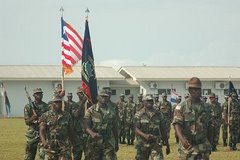
In the early morning of April 12 1980, a group of junior officers from the Armed forces of Liberia, led my Master Sergeant Samuel K. Doe, entered the Executive mansion, seat of the Liberian government, fought their way into the presidential suite and staged a bloody coup. thus starting a chain of events that would forever change the history of our country.
Doe's forces executed President William R. Tolbert, along with dozen officials of the Tolbert's regime, who were mostly of Americo-Liberian descent. This marked the first time since Liberia's establishment as a country that it was governed by people of native African descent instead of the Americo-Liberian elite. Doe became head of state and suspended the constitution, but promised a return to civilian rule by 1985. Many people welcomed Doe's takeover as a shift favoring the majority of the population that had been excluded from power, my mother said market women would dance and sing songs praising the military government with songs like, " native woman born soldiers, soldiers killed Tolbert.
Doe's forces executed President William R. Tolbert, along with dozen officials of the Tolbert's regime, who were mostly of Americo-Liberian descent. This marked the first time since Liberia's establishment as a country that it was governed by people of native African descent instead of the Americo-Liberian elite. Doe became head of state and suspended the constitution, but promised a return to civilian rule by 1985. Many people welcomed Doe's takeover as a shift favoring the majority of the population that had been excluded from power, my mother said market women would dance and sing songs praising the military government with songs like, " native woman born soldiers, soldiers killed Tolbert.

The late Liberian president William Tolbert is welcome to the white house by president Nixon.

Former American president Jimmy Carter waves to cheering crowds during his state visit to Liberia in 1979.
But Doe's government increasingly adopted an ethnic outlook, as members of his Krahn ethnic group soon dominated political and military life in Liberia. This caused a heightened level of ethnic tension leading to frequent hostilities between the politically and militarily dominant Krahns and other ethnic groups in the country.

Members of the people's redemption council led by Doe.

The execution of former government officials. April 12 1980.

President Doe pays a state visit to the U.S 1983.
Liberia in later years would be shaken to the very core, as a brutal civil war, which will last for almost two decade , pits tribe against tribe and leads to the death of more than 200,000 Liberians, the displacement of hundreds of thousands of others, and the destruction of the country's infrastructure.
On September 9, 1990, Prince Johnson head of the independent national Patriotic Front of Liberia (INPFL) captured Doe and tortured and killed him. The end of the Doe regime only continued the ethnic warfare in Liberia.



































